Home Safety Checklist For Virginia Beach
Being safe and secure in your home should be your number one concern. But are you missing one or two big safety components? Use this home safety checklist for Virginia Beach and discover where your home needs an update.
We give you a few whole-home safety ideas, and then we whittle it down to specific room ideas. Then, you can call (757) 241-4673 or fill out the form below to get your house safe and secure.
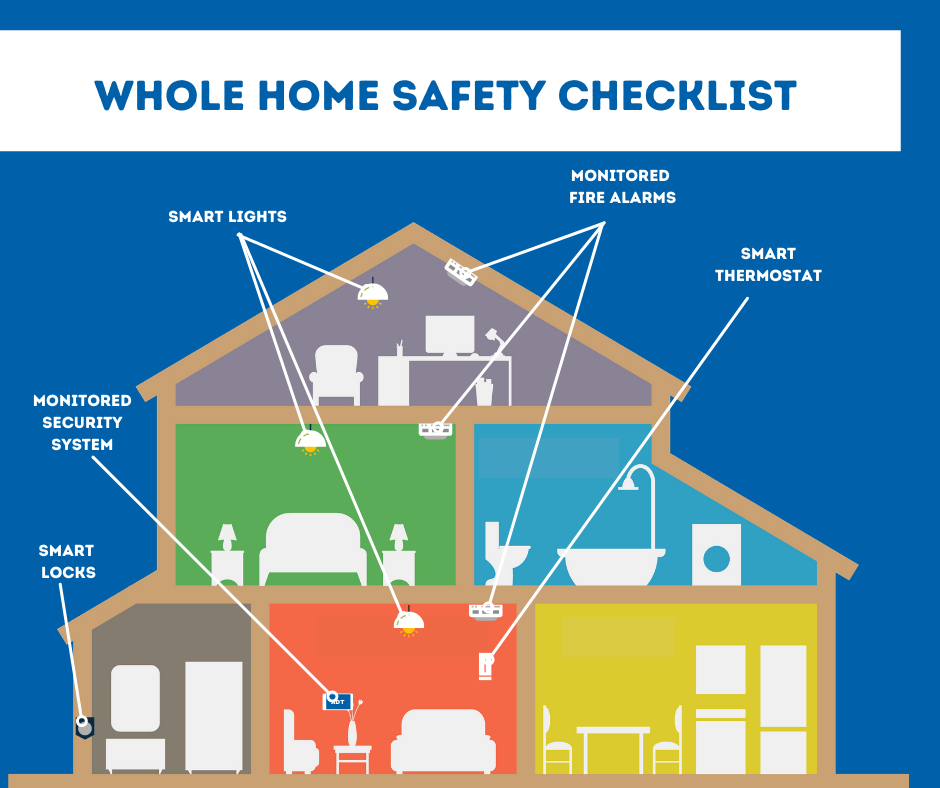
Essential Home Safety Checklist for Virginia Beach
While you may want to employ a room-by-room method for home safety, there are a few methods that are useful for each part of your house. These components can talk together through a touchscreen hub, and can even respond to other components. You can also control all your home safety equipment using a mobile app, such as ADT Control:
-
Monitored Home Security System: All your doors and windows should use a sensor that alerts your family to a break-in. As an alarm triggers, your monitoring team picks up the call and quickly sends a first responder.
-
Smart Lighting For Most Rooms: Of course, you can schedule your smart lights to become more eco-conscience. But smart lights can also allow you to stay safe in an emergency. Make your lights flash on when a sensor trips to scare off burglars or light a path to a safe place.
-
Smart Thermostat: Likewise, a smart thermostat in Virginia Beach should save you between 10%-15% in gas and electric spending. But it also can turn on an exhaust fan during a fire.
-
Monitored Fire Detectors: It’s code that you will have a fire detector on each level. You can improve your fire game by installing a monitored fire alarm that detects unusual heat and smoke, and pings your 24-hour monitoring team when it detects a fire.
-
Smart Locks: Every entryway that uses a keyed lock can upgrade to a smart lock. Now you may assign numbered codes to friends and family and get texts to your phone when the locks are unlocked. Your smart lock can even automatically unlock, letting you quickly flee the house if you have a fire or other emergency.
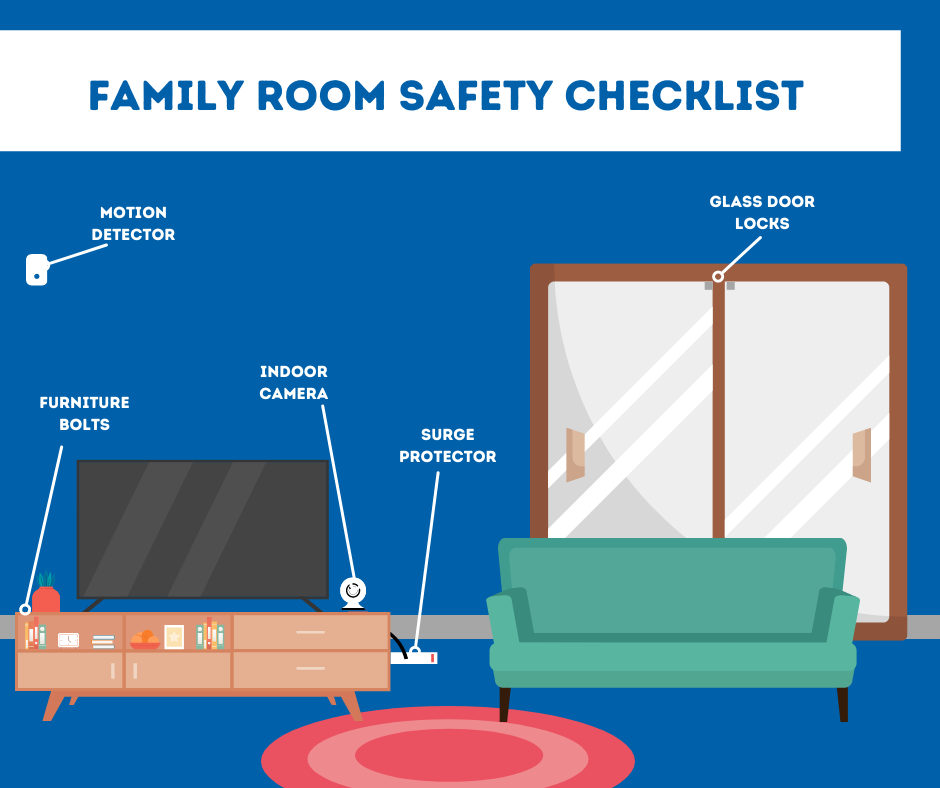
Living Room/Family Room Safety Checklist For Virginia Beach
You’ll spend most of your time in the living room, so it can be the best place to start making your house more secure. Highly sought after items, like a TV or stereo system, usually are located in your living room, making it an alluring room for thieves. Begin with placing a motion sensor or indoor camera by the doorway, then try all these safety protocols:
-
Motion Detectors: By installing motion sensors, you’ll have a high-decibel noise anytime they sense unusual motion in your living room. You’ll want motion detectors that aren’t set off by a dog or cat or you’ll see an alert each time your pet passes through for a midnight stroll.
-
Indoor Camera: An indoor security camera gives you a constant watch on your living room. Watch constant streams of your room so you can see what’s going on from the mobile app. Or talk with your kids in the living room by using the two-way talk feature.
-
Surge Protector/Outlet Maintenance: Protect those electronics and stop overtaxing your outlets with a surge protector. For extra energy-efficiency, install a smart plug with surge protection built-in.
-
Furniture Secured To The Wall: If you have babies or toddlers, you’ll need to bolt your heavy furniture and entertainment center to your wall. This is extra important if your family room has rugs or carpet that might make furniture extra unstable.
-
Enhanced Locks For Sliding Glass Doors: If your living room has a glass door that opens to a patio, deck, or screened-in porch, you can see that the lock is pretty worthless. Use a special lock, like a cross bar or locks that are located on the top and bottom of the opening.
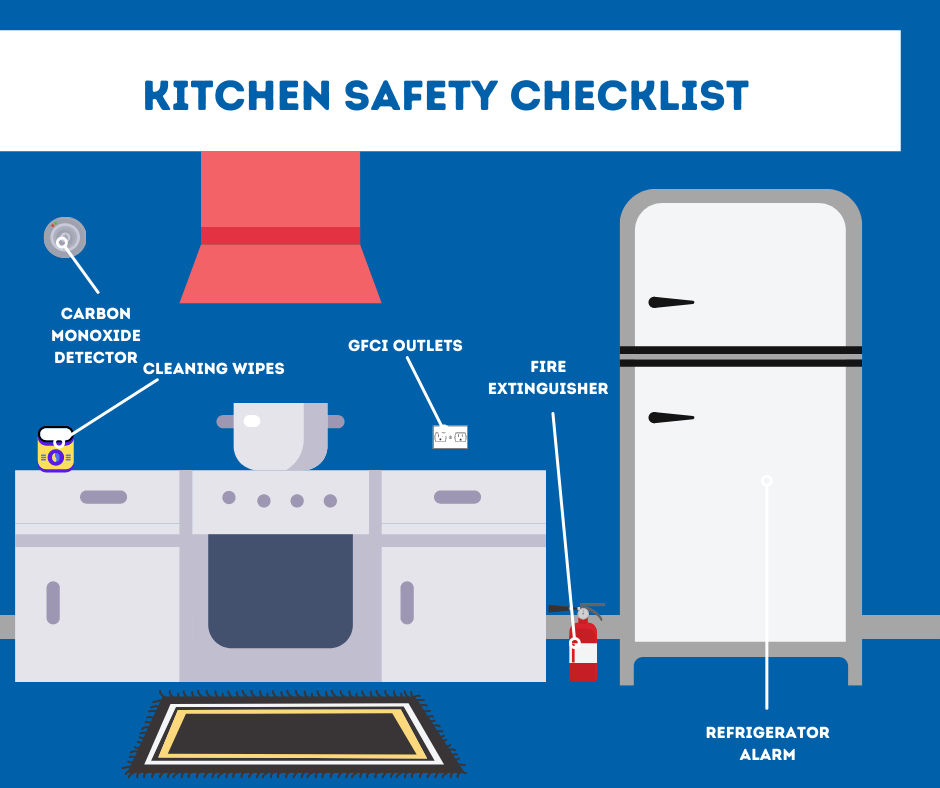
Kitchen Safety Checklist For Virginia Beach
Your kitchen has plenty of items that should provide safety and security to your home. Many of these items should be simple to add and should be found in the grocery store:
-
Fire Extinguisher: A fire can come from from an unwatched frying pan or a towel that’s too close to a burner. Always store a fire extinguisher in close reach for any kitchen mishaps.
-
Circuit Interrupter Box On Each Outlet: A GFCI outlet should be standard on outlets where they’re by water to ward off an electric shock. That means the plugs close to your sink and kitchen counter. Since the late ‘80s, it’s been required to have one GFCI per dedicated circuit. But all your plugs will go dead if one outlet senses a surge, so you’re going to want to install a single GFCI for every outlet.
-
Monitored Carbon Monoxide Detector: A carbon monoxide detector is recommended for spaces that employ natural gas for the stove and oven. If your gas appliances spring a leak, the carbon monoxide detector will cause a loud, buzzing noise and contact your monitoring professional.
-
Cleaning Wipes Or Spray: The biggest safety problem in the kitchen is actually bacteria and contamination that comes with raw meat and vegetables. Always have cleaning wipes or spray to clean your surfaces after making a meal.
-
Refrigerator/Freezer Alarm: The milk, meat, and perishables in the fridge need to stay at a constant temperature to stay healthy to consume. If you leave the refrigerator door open too long, then a small beep will tell you to close the door. Some fridges come with an alarm, older models don’t, and you’ll have to pick up a refrigerator alarm from the hardware store.
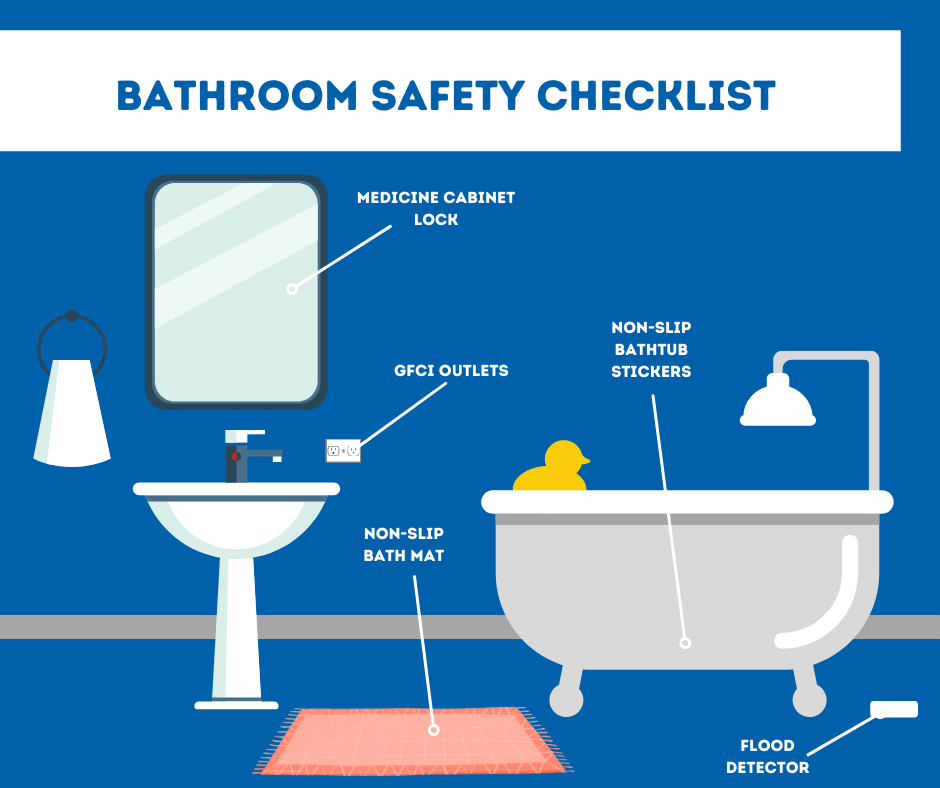
Bathroom Safety Checklist For Virginia Beach
Just because there’s not a bunch of room in your bathroom doesn’t mean that there aren’t safety concerns. From flood detectors to electric safety, here are five safety tips for your bathroom:
-
Flood Sensors: A leaking toilet or shower can lead to extensive destruction. Get alerted early about water problems with a flood detector before they generate hundreds to thousands of dollars in ruined floors, walls, and fixtures.
-
Non-slip Bathroom Mats: A fall in the bathroom can be devastating, causing cuts, gashed heads, or broken bones. Make sure you avoid these problems with a non-slip bathroom mat for after your bath or shower.
-
Textured Bathtub Strips: Likewise, a tub basin can be a slippery place to stand in. Make sure every tub has some non-slip stickers so your feet have a rough patch for stability.
-
Medicine Door Latch: If you have young toddlers or anyone with memory difficulties, you need to take additional care regarding medicine. Safeguard your prescriptions by using a medicine cabinet with a locking latch.
-
Circuit Interrupter Outlet: Just like the kitchen, you need to also install a surge protecting GFCI outlet on each bathroom receptacle. This will shut off the electric current if water splashes on them or you have a sudden surge from an electric razor or hair dryer.
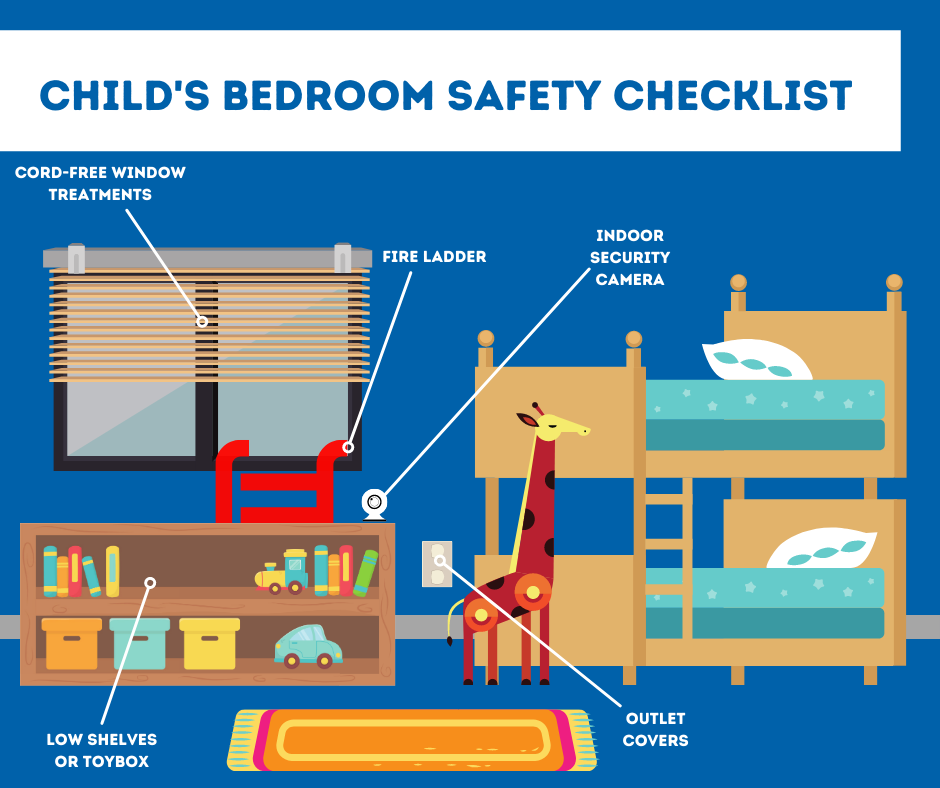
Children’s Bedroom Safety Checklist For Virginia Beach
A child’s bedroom should balance safety with simplicity. If their window shades or other items are safe but hard to operate, then your children may try dangerous activities -- like scale a bookshelf -- to open them. Here are 5 simple, yet safe, ideas:
-
Cordless Window Treatments: Safety experts have designated corded window treatments a hidden danger for children and animals. Put in motorized blinds or shades that you can easily control through a remote control. Or go state-of-the-art and link your motorized treatments to your ADT security system so they open on a schedule when it’s time to get up, and close at night for extra privacy.
-
Indoor Security Camera: A security camera perched on your kid’s desk can double as a high tech baby monitor that you can see from a mobile device. And when they want you, they can hit the 2-way talk feature on the camera.
-
Outlet Plug Covers: While every outlet should use outlet safety caps on them to protect your young children, this is especially needed in their bedroom. It’s the one place in your home where your toddler will most likely hang out by themselves without constant parental supervision.
-
Window Fire Ladder: If you have bedrooms on the second level, then you will want to install a window fire ladder. These will help a child leave the house even if the stairway or ground floor are blocked off with fire. Remember to go over how to unfurl them at least twice a year.
-
Toy Box Or Low Bookshelves: It’s interesting to think about a toy chest as a safety item, but you’ll see the light if you’ve ever tramped on an action figure in your socked feet. A clutter-free floor gives your child a quick way out when there’s an emergency.

Main Bedroom Safety Checklist For Virginia Beach
The master bedroom should be your calm space, so let your safety devices make you more responsive when you have an emergency event. After all, being startled awake by a wailing buzzer can be confusing.
-
Home Security Touchscreen: Having a touchscreen on your nightstand lets you see what’s what that noise was without getting out of bed. You could also turn on your ADT phone app but, the touchscreen is often easier to use to use when you’re coming out of sleep and finding your bearings.
-
Phone Charging Stand: We depend on our phones for so much now alarm clocks, internet searches, game machines, and sometimes even phones. However, a depleted cell will cut us off from the outside world if something goes wrong. So, a an easy-to-use charging station becomes an important part of your nightstand.
-
Nightlight/Smart Lights: A small light helps ground you when you’re startled awake from a fire alarm or other loud noises. If you have trouble falling asleep with a nightlight, put in smart bulbs in your bedroom and hall. Then you can get light simply with a push of a button or vocal command.
-
Fireproof Lockbox: Stash your important papers like birth certificates, passports, or a bankbook in a fireproof lockbox. Your safe can be a big one that sits in your closet or a small handheld safe that you can carry when you leave during a fire or other emergency.
-
Temperature Sensor: The problem with bedrooms is that they tend to feel too hot or be frigid because they sit far from the thermostat. A temperature sensor can communicate to your smart thermostat so you should have a nice, relaxing sleep at a wonderful temperature.
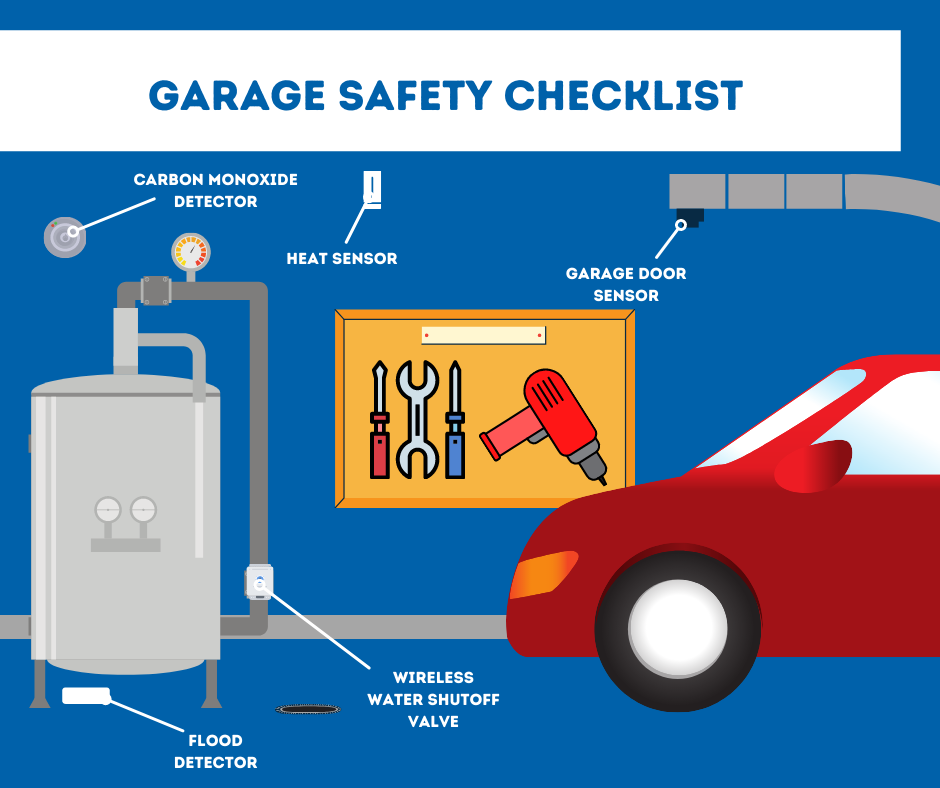
Basement/Garage Safety Checklist For Virginia Beach
Most safety issues in the basement or garage are with your water heater or HVAC system. Finding issues before they start can stop more devastating disasters later on. So, as you look around your basement or garage, check over these critical items:
-
Flood Sensor Or Sump Pump Alarm: Putting a flood sensor by your water heater and sump pump can stop you from finding a pond when you step into your basement or garage. Do you really want to spend your weekend getting rid of standing water?
-
CO Alarm: It’s beneficial to install a CO alarm in areas where a natural gas leak can spring up. If you have a gas furnace, try to hang an alarm in the same area as your inbound pipes.
-
Remote Water Shutoff Valve: If your flood alarm finds a plumbing leak or a broken pipe, then you will want to cut off the primary water valve quickly. With a wireless shutoff valve, you can block water flow from your phone. That’s helpful when you’re visiting relatives and get a water leak text on your phone.
-
Garage Door Sensor: Leaving the garage up causes all sorts of problems. You can lose a bunch of HVAC energy through that gaping hole, and rodents or intruders can just saunder in. A remote sensor will text you about a neglected garage door and lets you close it remotely.
-
Heat Sensor: A heat alarm in your garage or basement is a definite if you worry about your pipes freezing. The heat in these rooms can be drastically different than the main part of the home, so you will need to have a constant look on the temperature with your mobile app.
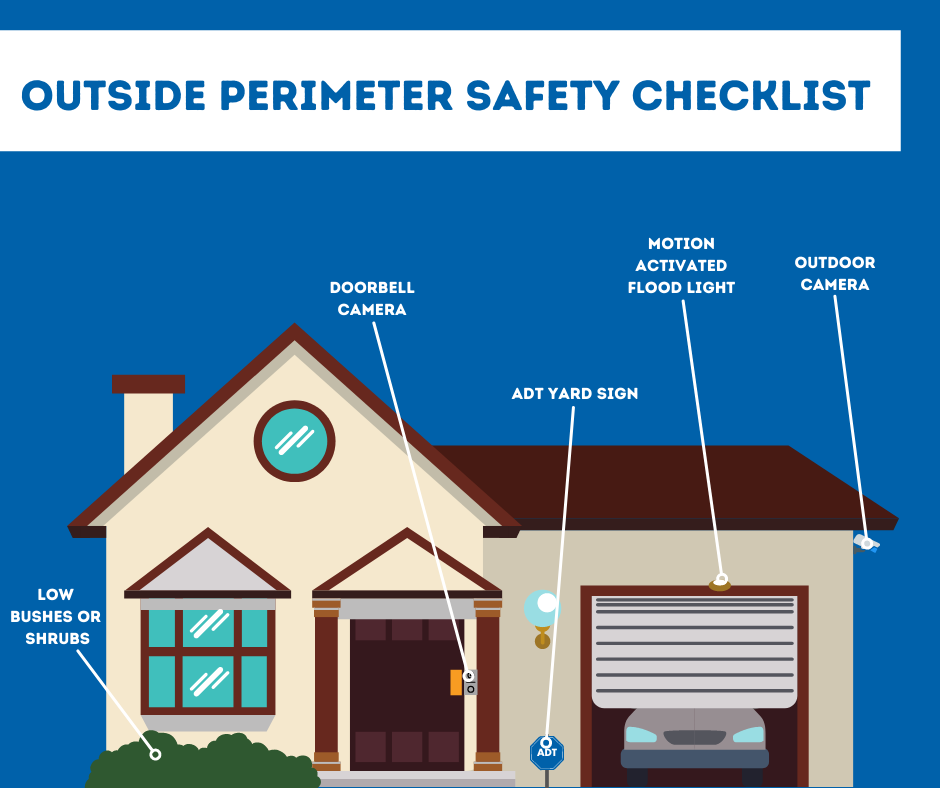
Home Perimeter Safety Checklist for Virginia Beach
Your foliage, drive, and front walk are just as important to make safe as the rest of your house. Use this checklist to defend your perimeter:
-
Doorbell Camera: See who’s at the door before you open it and talk to visitors. View deliveries and record video clips if they disappear.
-
Outdoor Camera: You can hang outdoor security cameras to notify you about unusual activity in your yard. These security cameras are especially useful in areas where you might not have a view -- like a side yard or by the garage door.
-
Low Shrubs: Overgrown bushes can offer some solitude, but they also obscure your line of sight of the outside. Don’t give potential burglars a place to hide. Plus, high shrubs or trees too close to your house can jam up gutters and bring in ants and termites.
-
ADT Yard Signs: One of the most popular disincentives for a break-in is advertising to would-be rogues that you use a monitored ADT security system. An ADT yard stick by the stoop and a window sticker will tell lurkers that they should keep walking to an unprotected target.
-
Motion Controlled Porch Lighting: Light is the greatest deterrent to those who skulk in the dark. Motion-triggered lighting on your deck, porch, or garage can frighten lurkers away. They also help you get inside when you arrive back home late at night.
Use Secure24 Alarm Systems To Help You Finish Your Home Safety Checklist for Virginia Beach
While Secure24 Alarm Systems can’t install each household item on your Virginia Beach home safety checklist, we can bring you a customized security system. With easy-to-use devices and ADT monitoring, we can personalize the perfect system for your family’s needs. Simply phone (757) 241-4673 and talk to a professional or fill out the form below. Or customize your own solution with our Security System Designer.
